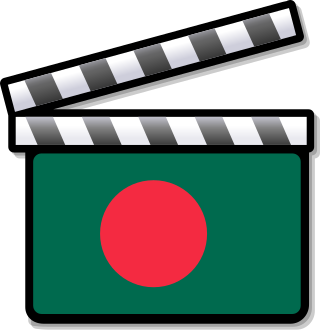
The Cinema of Bangladesh, also known as Bangla cinema, is a diverse and vibrant entity, consisting of films produced across various regions in Bangladesh, each contributing its unique linguistic and cultural perspective. Beyond the dominant Dhaka based Bengali-language film industry Dhallywood, which is a portmanteau of "Dhaka" and "Hollywood", Bangladesh is home to cinema in several other languages and dialects. For instance, Chakma cinema from Bandarban, Garo cinema from Sherpur, Meitei and Sylheti cinema from Sylhet, Chatgaiya cinema from Chattogram. These regional cinemas play a crucial role in preserving and promoting the linguistic and cultural heritage of the country. The dominant style of Bangladeshi cinema is melodramatic cinema, which developed from 1947 to 1990 and characterizes most films to this day. Cinema was introduced in Bangladesh in 1898 by the Bradford Bioscope Company, credited to have arranged the first film release in Bangladesh. Between 1913 and 1914, the first production company, Picture House, was opened. A 1928 short silent film titled Sukumari was the first Bengali-produced film in the region. The first full-length film, The Last Kiss, was released in 1931.
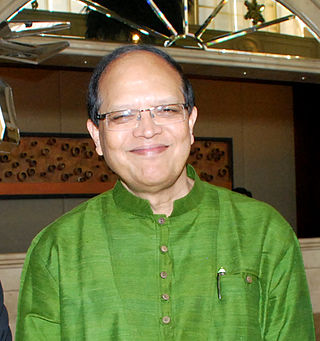
Atiur Rahman is a Bangladeshi development economist, author, and banker. He served as the 10th Governor of Bangladesh Bank, the central bank of Bangladesh. He has been called "the banker of the poor" for his contributions in developing the Bangladeshi economy. Rahman is credited with instituting changes in the banking industry that greatly increased the country's foreign exchange reserves and brought automation and digitization in the banking sector. Achievements during his tenure include the creation of the National Payment Switch; introducing automated check clearing for banks using local currency cheques; starting mobile banking; establishing the Bangladesh Electronic Funds Transfer Network (BEFTN); and installing the Bangladesh Automated Clearing House (BACH). On 15 March 2016, he resigned as central bank governor after the cyber hacking and theft of US$101 million in foreign reserves from the Bangladesh Bank account held at the Federal Reserve Bank of New York.

SM Aslam Talukder Manna, known by his stage name Manna (মান্না), was a Bangladeshi film actor and producer.

Fazlur Rahman Babu is a Bangladeshi actor and singer. He won the Bangladesh National Film Award for Best Supporting Actor a record five times for his roles in Shonkhonaad (2004), Meyeti Ekhon Kothay Jabe (2017), Fagun Haway (2019), Bishwoshundori (2020) and Nonajoler Kabbo (2021). He also won Best Performance in a Comic Role for Gohin Baluchor (2017).

Masud Rana, better known by the stage name Shakib Khan, Bengali pronunciation:[ˈʃaːki:bxaːn], is a Bangladeshi actor, producer, businessman, occasional singer, film organiser, and media personality who works in Bengali films, both in Bangladesh and India. He is widely regarded as one of the most popular and influential figures in Bengali cinema and is considered to be one of the most successful actors in the country's history. In his career spanning about two decades and 250 films, Khan has been the propeller of the contemporary film industry, Dhallywood. As of 2022, he was the highest paid actor in Bangladesh and West Bengal.
Montazur Rahman Akbar is a Bangladeshi film director, screenwriter, producer, social activist and entrepreneur. He is known for his work in the Bengali-language film industry, which is centered in Dhaka, Bangladesh. Akbar also fought in the 1971 Bangladesh Liberation War.

Shahid Hasan, known by professionally as Misha Sawdagor, is a Bangladeshi film actor known for playing villains. As of 2020, according to him, he has performed in more than 700 films. He won Bangladesh National Film Awards 3 times for his roles in the films Boss Number One (2011), Olpo Olpo Premer Golpo (2014) and Bir (2020). He first got noticed as a villain in the 1995 film Asha Bhalobasha starring Salman Shah. After Shah's death, he continued playing the villain opposite other actors, but failed to achieve any mainstream success or recognition. From 2006 onwards he started playing the main antagonist in a long string of hit movies starring Shakib Khan in the lead role and mostly Apu Biswas as the lead actress, and established himself as a leading antagonist in the Cinema of Bangladesh.
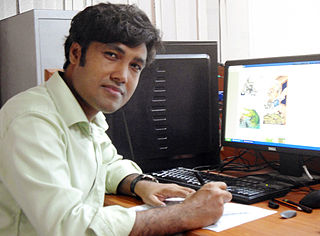
Khalil Rahman is a Bangladeshi political cartoonist. His cartoons have been appearing on the front page of some leading Bengali dailies including Prothom Alo, Jugantor, and Samakal.
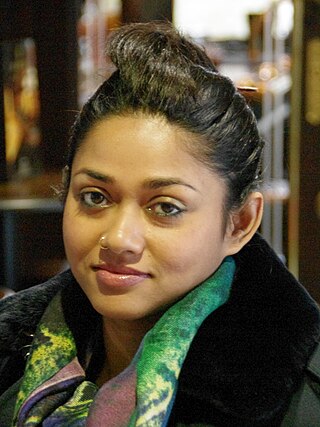
National Film Award for Best Director is the highest award for film directors in Bangladesh, presented annually at Bangladesh National Film Awards ceremony by the Ministry of Information. It is given in honour of a film director who has exhibited excellence directing in Bangladeshi cinema. Since 1975, the award is given annually except in 1981, 1998 and 2003. It is presented by the President of Bangladesh at a ceremony held in Dhaka.

Abdur Rahman was a Pakistani-Bangladeshi actor and film director. He acted in Bengali, Urdu, and Pashto films in Dhaka, Karachi, and Lahore from 1958 until the 1980s.

Muhammad Masum Aziz was a Bangladeshi stage, film and television actor. He played in more than four hundred dramas and films since 1985. He won Bangladesh National Film Award for Best Supporting Actor for his performance in the film Ghani (2011) and in 2022, he was awarded the Ekushey Padak for his contribution to acting by the government of Bangladesh.
Lal Kajol is a 1982 Bangladeshi film starring Shabana and Farooque opposite him. Child actor Bindi Rahman garnered Bangladesh National Film Awards for Best Child Artist and producer Azizur Rahman garnered Best Film Award at Bachsas Awards.
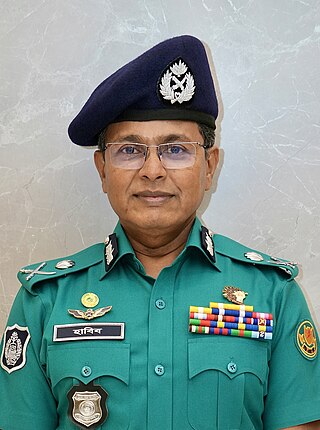
Habibur Rahman is a former Bangladeshi police officer. He served as 35th commissioner of DMP. Prior to join here he was head of the Tourist Police. From 2019 to 2022, he was deputy inspector general (DIG) of Dhaka Range, and DIG of administration and discipline at the police headquarters in Dhaka. He was sent into retirement from government service in public interest according to the provisions of section no. 45 of the Public Service Act, 2018.
Mohammed Motin Mia, also spelled as Matin Miah, is a Bangladeshi professional footballer who plays as a winger or center forward. He last played for Bangladesh Premier League club Bashundhara Kings and the Bangladesh national team.

Golam Rahman is an educationist, media researcher and communication expert of Bangladesh. He has served as the Chief Information Commissioner of the Information Commission of Government of Bangladesh. He also served as the chairman of Bangladesh Sangbad Sangstha (BSS) the chairman of the department of mass communication and journalism of University of Dhaka as well as head of journalism department of Daffodil International University. He is the editor of Bengali daily Ajker Patrika.
Sayeem Rana is a Bangladeshi singer, composer, music director, poet and professor. His full name is Md. Ziaur Rahman. He won Bangladesh National Film Awards in best music director category for the film Nekabborer Mohaproyan in 2014. Prothom Alo Best Book Award 1416 and Dean's Award 2022 from Arts Faculty, University of Dhaka. He is an associate professor in the Department of Music of Dhaka University.
Anisur Rahman Anis was a Bangladeshi film, television and theatre actor who acted in more than 250 films. He was known for acting in comic roles.
Ejaz Ahmed Chowdhury is a retired major general of Bangladesh Army and a freedom fighter of the Liberation War. He served as the Director General of Bangladesh Rifles from 12 February 1995 to 18 July 1996.












